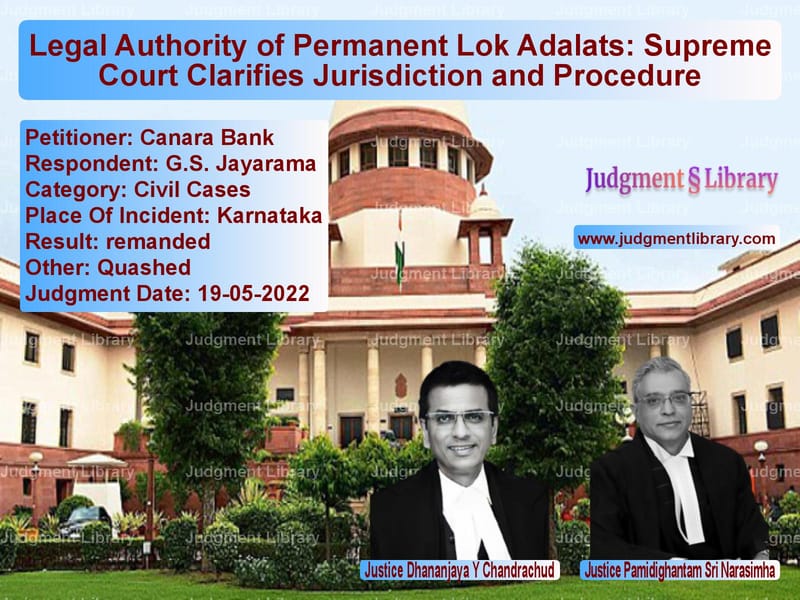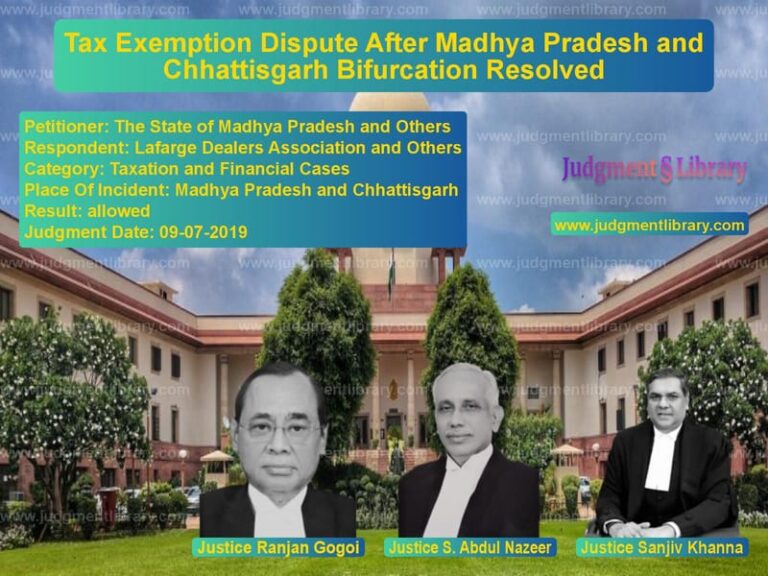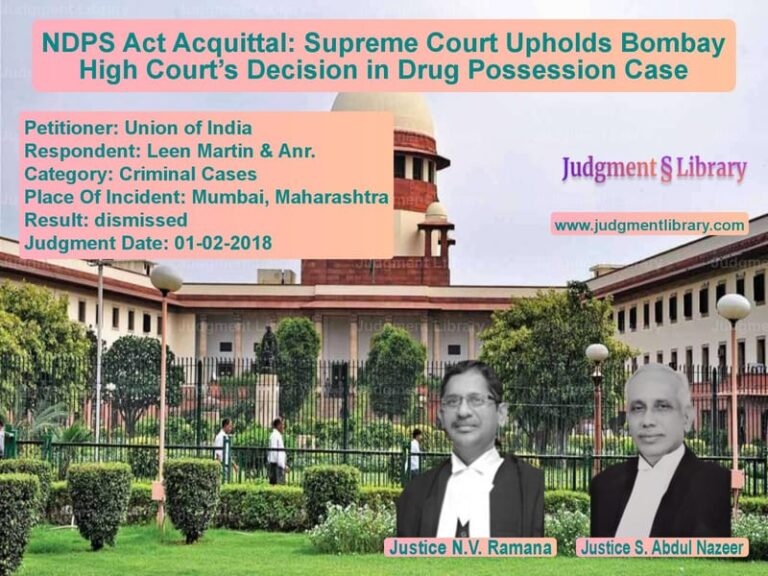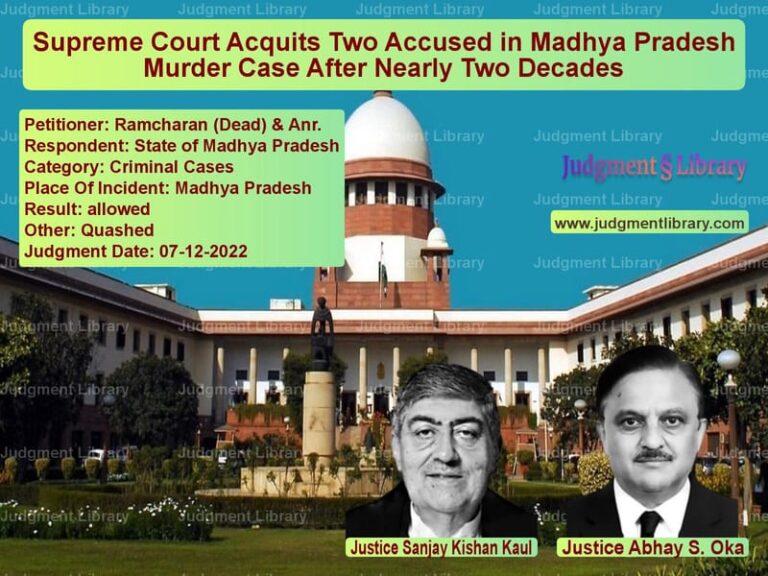Legal Authority of Permanent Lok Adalats: Supreme Court Clarifies Jurisdiction and Procedure
The Supreme Court of India recently delivered a crucial ruling in Canara Bank vs. G.S. Jayarama, clarifying the jurisdiction and adjudicatory powers of the Permanent Lok Adalats (PLAs) under the Legal Services Authorities Act, 1987. The case centered around a banking dispute referred to the PLA, which led to multiple appeals questioning the legality of its award. The Supreme Court upheld the necessity of following proper conciliation procedures and emphasized the limitations on the adjudicatory functions of the PLAs.
Background of the Case
The dispute originated when Syndicate Bank (now merged with Canara Bank) filed an application before the Permanent Lok Adalat (PLA) in Mangalore for recovering an outstanding loan of ₹2,40,583 from G.S. Jayarama. The PLA proceeded with the case and issued an award directing the repayment of the loan along with interest.
The respondent, Jayarama, challenged the PLA’s decision before the Karnataka High Court, which ruled in his favor by setting aside the award. Canara Bank then appealed to the Supreme Court, arguing that the PLA had properly exercised its jurisdiction under the Legal Services Authorities Act (LSA Act) and that the High Court had erred in quashing the award.
Arguments of the Petitioner (Canara Bank)
Canara Bank contended:
- The PLA had jurisdiction to adjudicate disputes related to public utility services, including banking.
- The proceedings before the PLA followed the statutory framework under the LSA Act.
- The respondent had failed to participate in the conciliation process despite multiple notices.
- The High Court wrongly interpreted the powers of the PLA, disregarding the legal validity of its decision.
Arguments of the Respondent (G.S. Jayarama)
Jayarama countered:
- The PLA had exceeded its jurisdiction by issuing an award without proper conciliation efforts.
- The legal framework required the PLA to facilitate a settlement first, and only if conciliation failed could it proceed to adjudication.
- The High Court correctly ruled that the PLA could not act as a regular civil court.
- The bank’s claim was not appropriately handled, as the PLA had not ensured due process.
Supreme Court’s Observations
The Supreme Court analyzed the legislative framework of the LSA Act and examined the procedural requirements for cases before the PLA. Key observations included:
- Conciliation is Mandatory: The PLA must first attempt conciliation before proceeding to adjudication. It cannot directly issue an award if no conciliation effort has been made.
- Jurisdiction of PLAs: The PLA has jurisdiction over disputes related to public utility services, including banking, but must follow statutory procedures.
- Limitations on Adjudicatory Powers: The PLA is not equivalent to a regular civil court and cannot act beyond its legally defined role.
- Finality of PLA Awards: While PLA awards are binding and enforceable as civil court decrees, they must be based on proper legal procedures.
The Court highlighted:
“The Permanent Lok Adalat must ensure a proper attempt at conciliation before moving to adjudication. The absence of this step renders its decision unsustainable.”
Judgment and Directions
The Supreme Court ruled:
- The PLA’s award in favor of Canara Bank was invalid due to procedural lapses.
- The Karnataka High Court was correct in setting aside the award, but its reasoning regarding the PLA’s adjudicatory powers was incorrect.
- The case was remanded for proper conciliation proceedings under the PLA.
Key Takeaways from the Judgment
- The ruling reinforces that PLAs cannot bypass mandatory conciliation processes.
- The decision clarifies that PLAs have adjudicatory powers but only under defined statutory conditions.
- Public utility service disputes must be handled through a balance of conciliation and adjudication.
- Courts will intervene if procedural irregularities are found in PLA proceedings.
Conclusion
The Supreme Court’s ruling in Canara Bank vs. G.S. Jayarama provides clarity on the role of Permanent Lok Adalats and reinforces the importance of following proper legal procedures. By ensuring that conciliation remains the first step in dispute resolution, the Court has strengthened the principles of fairness and justice in alternative dispute mechanisms. The judgment sets a significant precedent for future cases involving PLAs and their jurisdiction over public utility services.
Read also: https://judgmentlibrary.com/land-compensation-dispute-supreme-court-ruling-on-haryana-acquisitions/
Petitioner Name: Canara Bank.Respondent Name: G.S. Jayarama.Judgment By: Justice Dhananjaya Y Chandrachud, Justice Pamidighantam Sri Narasimha.Place Of Incident: Karnataka.Judgment Date: 19-05-2022.
Don’t miss out on the full details! Download the complete judgment in PDF format below and gain valuable insights instantly!
Download Judgment: canara-bank-vs-g.s.-jayarama-supreme-court-of-india-judgment-dated-19-05-2022.pdf
Directly Download Judgment: Directly download this Judgment
See all petitions in Contract Disputes
See all petitions in Debt Recovery
See all petitions in Judgment by Dhananjaya Y Chandrachud
See all petitions in Judgment by P.S. Narasimha
See all petitions in Remanded
See all petitions in Quashed
See all petitions in supreme court of India judgments May 2022
See all petitions in 2022 judgments
See all posts in Civil Cases Category
See all allowed petitions in Civil Cases Category
See all Dismissed petitions in Civil Cases Category
See all partially allowed petitions in Civil Cases Category







